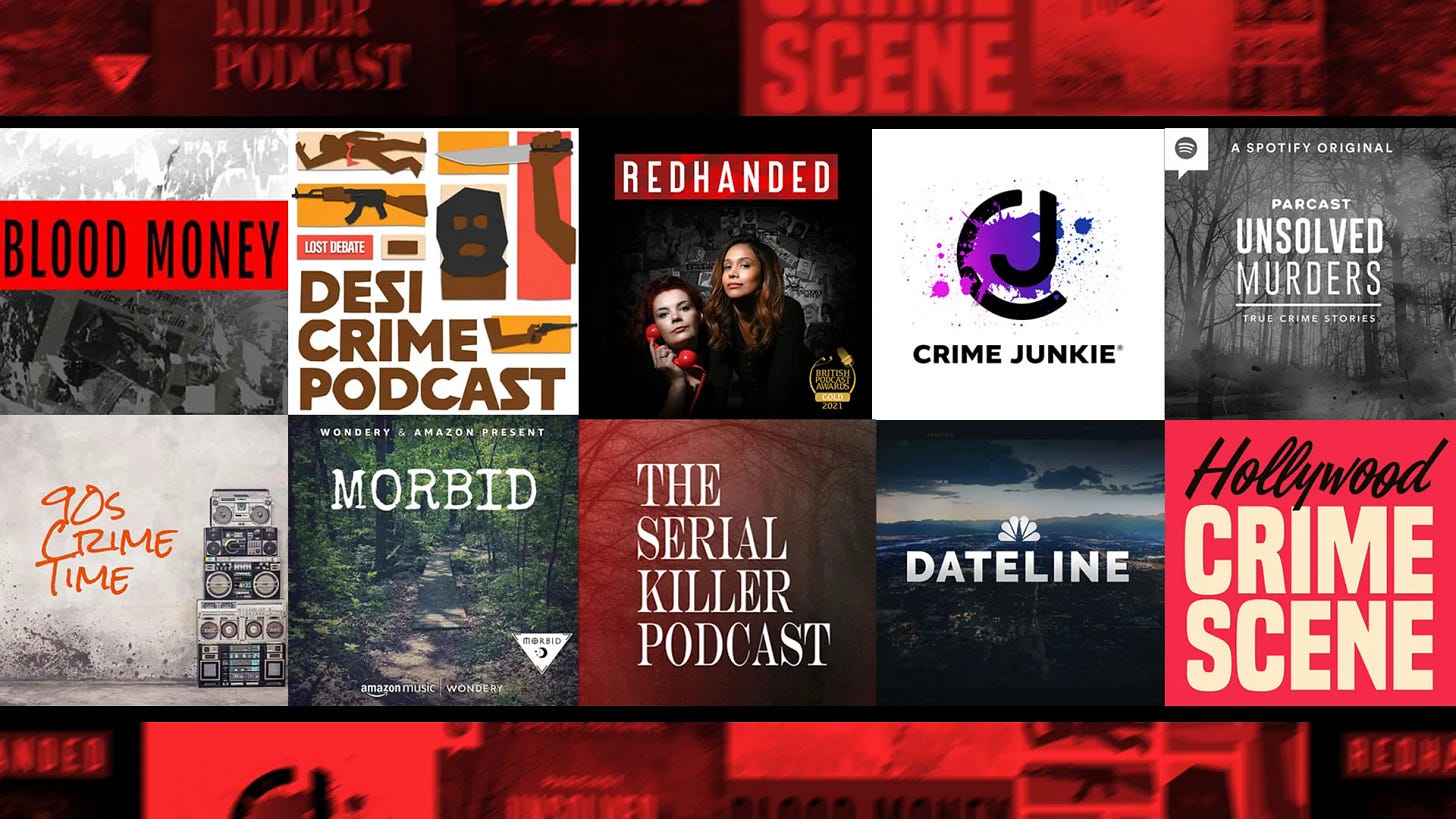Why Our Morbid Curiosity Leads Us To True Crime
What do serial killer show binges, murder subreddits, and true crime podcast fan groups reveal about our human impulses?
Have you ever been the person that ended a conversation in a group chat?
While I’ve been that person plenty of times in my life, a recent conversation got me thinking more. In a fun chat about tv show recommendations, I paused when it was my turn before sharing the grim truth: my current binge was a fictional dramatization of serial killer Jeffrey Dahmer.
That did it. Conversation over.
If you’ve seen the show and the acting of Evan Peters (who’s brilliant in it!), then you might understand where I’m coming from. Maybe you’ve binged the Zac Efron Ten Bundy series. Maybe you’ve rewatched gruesome scenes from the Gladiator or Game of Thrones. Maybe your warped curiosity has led you into the depths of Wikipedia to clarify how valid these murder renditions even are.
In any case, you probably understand the challenge of trying to recommend a show that is - for lack of a better word - fucked up.
True crime or even dramatization of a crime isn’t new. Shows such as “Crime Junkie” and “My Favorite Murder” rank among the top podcasts in the country. Even shows like “Serial” has an indelible impact on case evaluation, leading to its core murder conviction getting overturned. The genre has proven so popular that streaming platforms like Netflix (which claims “You” and “Making a Murderer” among its most binged shows) has no plans to stop.
There are a lot of uncomfortable questions here. Sensationalist stories and even non-fictional crime stories seem to sell. Despite the many shows Netflix could have chosen to produce this year, two of them are about the same serial killer. Even family-friendly Disney Plus is on a new true crime kick, knowing even a good Little Mermaid documentary won’t capture the morbid lust of the human imagination.
The simultaneous dynamics seem almost contradictory.
We love watching this stuff, as evidenced by the fact that content producers keep making it.
We’re also clearly embarrassed to tell people we are watching some of this stuff for fear of seeming odd or unhealthy.
But the seemingly most screwed up part is the extension of the macabre craze, whole communities popping up, exposing the weirdest aspects of the human psyche.
Similar to how fan groups pop up around sports and reality show conspiracy theories, murder seems to have its own community aspect. Twitter driving threads on necrophilia, TikTok driving Dahmer polaroid reaction videos, and even Reddit communities like crime scene photos getting thousands of users a week asking for bodies, crime scene photos, and gruesome pictures.
Even if I found myself a bit curious after watching both the “Conversations of a Killer” and the “Dahmer” show. I read every line in his Wikipedia page, watched interviews, and read reviews from his neighbors all to understand a question I couldn’t wrap my head around: How is this guy real?
None of us will seek to glorify a serial killer out of choice, but many of us still sink into their darkest deeds out of temptation.
What makes this all so appealing?
To better understand why we’re this screwed up, I found some answers in history and psychology.
In his piece for Psychology Today, behavioral scientist Coltan Schrivner shares that our fascination starts with the evolutionary relationship around predators,specifically around trying to identify when a predatory is hungry or actively hunting.
Our human instinct to seek out predators started from our early days as cavemen. Over time, this same innate desire joined forces with a more low-risk way to do this: content.
“Humans have a uniquely impressive ability to imagine events and experience them through mental simulation. By imagining dangerous situations, humans can generate scenarios where the perceived learning benefit is high, but the cost of learning is low. These low-cost opportunities to observe dangerous situations attract our attention, acting like candy for our anxious minds.”
Schrivner coins a term called “morbid curiosity” to describe this fascination, which saw curiosity as the core incentive. We want to understand motivations, signs, and behaviors. We want to try and spot them in the wild.
Netflix, podcasts, TikToks, and other consumption methods allow us to do this risk-free. While the running joke on Twitter is that fans of these genres are quasi-armchair lawyers, detectives, or criminologists, it’s because we find comfort in doing that job without the risk of being wrong, humiliated, or hurt.
Criminology expert Scott Bonn shares another explanation - more than looking out for predators; we're looking to explain basic gaps in our understanding.
“The average person who has been socialized to respect life and who also possesses the normal range of emotions such as love, shame, pity, and remorse cannot comprehend the workings of a pathological mind that would compel one to abduct, torture, rape, kill, engage in necrophilia, and occasionally even eat another human being.”
We can’t stand gaps in our understanding of why someone has done something, especially as warped as Dahmer. We can’t stand seemingly inexplicable behaviors. We can’t sit comfortably with gaps.
Shubhanjana Das takes it one step further in a piece for Vice around our serial killer fascination: there’s almost a perverse pleasure in seeing what the human mind is capable of. A guilty pleasure of sorts.
Bohn even adds in his piece that serial killers for adults are what monster movies are for children - for better or worse, they drive some moral clarity for people who understand what true evil looks like as it exists in the world, along with some level of storytelling.
We just don’t want to admit it fully. If someone asks how your Sunday night was, you’d be hard-pressed to say you quite enjoyed a nice dinner watching “Conversations With a Killer” with eager and intent eyes.
It’s somehow both a known maxim that we all like this, yet an unspoken secret.
This begs the earlier question: Are we fueling some dark wheel that content networks have no choice but to keep spinning? Is this fixture of curiosity around serial killers a disease we must try to cure? Or is it something we, as a society, should learn to accept as an inherent and, dare I say it, acceptable part of our nature?
It’s an interesting question in the marketing world, where content creators have to grapple with what is comfortable vs. what is grappling.
While I hope no consumer brand thinks about running a sensationalist Jeffrey Dahmer-themed brand campaign, I’m reminded of an anecdote I read from Obsessed by Emily Heyward a few months back around “The Why Test.”
If you ask someone “why” they want to do something, Heyward concluded that it always ends in a fear of death.
“That’s because everything we do as humans, whether we know it or not, is ultimately motivated by knowledge of our own mortality.”
In some weird, wacky dimension away from the sensibilities of our normal friends, we are also harboring this fear of death.
It explains some more trivial marketing conundrums - like why we pay so much for fancy water bottles - but it also explains this more gruesome side of our human psyche.
We want to survive. Part of that survival involves understanding what we don’t understand.
As long as it drives a curiosity, no matter how morbid, I doubt Netflix, Disney, Hulu, or anyone else will be motivated to slow down anytime soon.




Really great points here. I personally find the non-fiction shows so much more entertaining than the fiction. I think it’s because I’ve always been fascinated with the human mind and how these criminals are wired so much different than the average joe.
Great post. I've always wondered about the fascination myself. I feel like my appetite for true crime content has decreased ever since I've gotten involved with justice reform, but I know other advocates who deal with the system all day and still sneak in a murder mystery on the weekends (for all the reasons you enumerate here!)